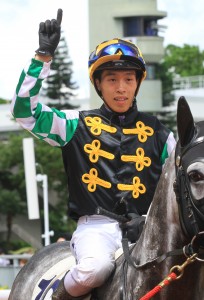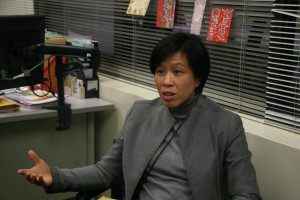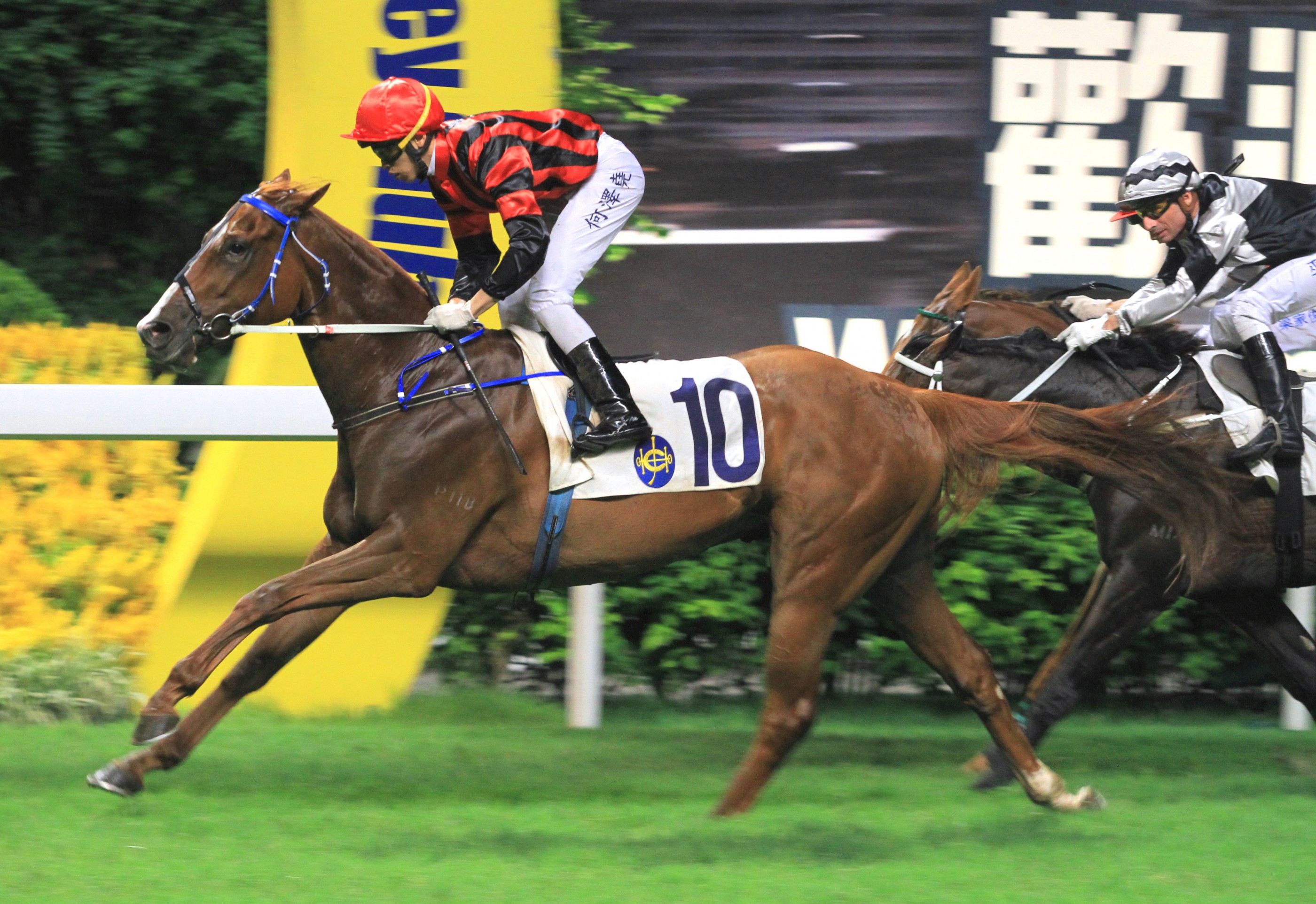Jockeys need discipline and grit to excel in horseracing
By Tracy Cheung and Henry Lee
At 4:30 a.m., when most people are still in bed at, the jockeys are already out riding at Sha Tin Racecourse, preparing for the races held every Wednesday and Saturday at one of Hong Kong’s two venues.
Many people only associate horse racing with gambling, little realising that it is a sport with a long history and a reputation as one of the most dangerous.
Jockeys have to undergo years of training before they can ride in races and they also have to follow a strict daily routine. Vincent Ho Chak-yiu, 23, an active local jockey, wakes up at 3:45 a.m. every day so that he can start exercising the horses ‒ and learning about their behaviour and temperament ‒ at the Sha Tin course by 4:30 a.m. After riding eight to 10 horses every morning, he has breakfast. He will either take a nap in the afternoon or go to the gym for fitness training. Before each race day, he has to look at the form for the horses he will ride and develop suitable racing strategies.
“If you want to be the top of the top, self-discipline is extremely important,” says Ho.

That discipline means a jockey’s daily routine is more or less the same; repetitive, dull and montonous. Jockeys must be very disciplined to withstand temptations like staying up late.
Apart from a disciplined lifestyle, a jockey must work hard to maintain a low weight. In all handicaps, the maximum allocated weight is 60.3kg and the minimum allocated weight should be no less than 51.3kg. Since there are strict limits on the carried weight of horses, jockeys are expected to weigh around 49 to 53.5kg.
There is significant advantage to being light as jockeys may have more opportunities to ride a wider variety of horses of different sizes if they are light. Ho has resorted to extreme methods to maintain a low weight in the past.
He recalls how, when he was undergoing jockey training in New Zealand, he tried running in a long-sleeved windbreaker during the summer so that could sweat more in order to lose weight. Another time, he put chocolates into his mouth just so he could taste them before spitting them out again seconds later. Ho does not go to such extremes now and is more flexible about what he eats even though he still has to watch his weight.
But while jockeys strive to keep the pounds off, they also have to be physically strong. With as many as 10 races a day, a jockey needs to have stamina.
Still, keeping fit, trim and strong are not the most difficult aspects of being a jockey. Rather it is the dangerous nature of the job. “Horse racing is an extremely dangerous activity, it could almost be regarded as the most dangerous sport in the world,” says Ho who was unseated from a horse, hit by another trailing behind and broke his arm badly in a race in February 2012. It took him seven months to recover after the accident.
A racehorse can gallop at up to 70 km per hour and the rider, with rump in the air, is elevated around 2 metres above the ground during the race. This means that an accident where a jockey is unseated can cause serious injury or even death.
Ho says horse racing is even more dangerous than Formula One racing because the jockey is controlling an animal, which is a living, thinking creature, while a racing car driver is merely controlling a machine.
But with the danger can come great reward. The prize money from each race is a major source of income for jockeys. Under the current prize money distribution system, a jockey gets 10 per cent of the total prize money if he wins a race and 5 per cent of the total prize money if he finishes in second to fifth (or sometimes 6th) place. For each race they ride, jockeys earn a HK$1,000 race fee. Normally in a Class 1 race, the prize money is HK$2 million. However, in some international competitions, the jackpot can be over HK$20 million. As a result, many jockeys can earn a considerable amount of money through prize money. Some of the top jockeys earn over HK$1 million a year.
“You can make a living from being a jockey but you will never be successful if you just want to make a living from it,” says Ho, adding that a jockey should always work to improve.
Although the life of a jockey is not easy, hundreds of youngsters flock to apply for a place at the Jockey Club’s Apprentice Jockeys School (AJS) every year. The school was established in 1972 and many well-known jockeys have been trained there. Some of them are now experienced trainers themselves, including Me Tsui Yu-sak who was an apprentice in the 1980s.
The over-subscription to the programme shows Hong Kong teenagers are enthusiastic about horse racing as a career. This was not the case in Tsui’s time. “Not many people wanted to become a jockey in my time. Not many people paid much notice to this industry,” says Tsui.
Tsui believes the prize money may be a big attraction for teenagers. “Now the prize money has doubled or tripled when compared to the old times,” he says. And it is not just the prize money. Tsui says the salary and welfare jockeys receive are a lot better than in his day too.
These days, most Hong Kong apprentice jockeys have the chance to train and race overseas in countries such as Australia and New Zealand before they ride in Hong Kong races as apprentice jockeys. Tsui thinks this is a good practice because it helps to build up the confidence of young jockeys, especially when they race against foreign world-class jockeys stationed in Hong Kong. “In the past, we didn’t need to go overseas; once you passed in Hong Kong, you could ride,” says Tsui.
Although the structure and training provided by the AJS have changed over the decades, it remains the only institution that provides systematic and qualified training for would-be jockeys in Hong Kong. Anyone who aspires to enter the field must receive training here.

Amy Chan Lim-chee, headmistress of Apprentice Jockeys’ School, has been leading AJS for seven years. “Every year there are around 400 to 500 applicants. I would choose around 10 to 20 students among the applicants… I hope there are three to four potential jockeys [in each batch],” says Chan.
Applicants for the three-year programme should be between 14 to 17 years old and are expected to meet certain physical requirements. For instance, they should weigh less than 43.1kg and be under 1.57m tall. Applicants also need to go through an interview and undergo some fitness tests as jockeys need to have good balance, strength and stamina.
Apart from physical attributes, personal qualities matter. Chan has certain expectations of trainees. “Firstly, integrity is crucial; they have to know how this industry works ethically. They should dedicate themselves to the industry too.
Moreover, as they have to endure a lot of hardship, the attitude is crucial,” says Chan. “If they are not prepared for this tough journey, he or she should not ever be admitted [to AJS].”
The strict selection criteria does not seem to deter youngsters from applying for the school.
“There are many people re-apply to the school,” says Chan, recalling a student who was admitted on his third attempt, after she noticed he had really changed and was now mature enough to enter the school.
In view of the shortage in places for riding trainees in recent years, Chan foresees teenagers’ enthusiasm for the industry will remain high in the near future.
However, to maintain enthusiasm in the long run will require some re-branding and re-packaging. “Many old-fashioned people might think that it [horse racing] equals gambling, but we have to turn it into a relatively positive image,” Chan adds.
“They [racing trainee] have to present themselves as athletes. You have to know their training does not differ much from that of a ‘real’ athlete.”
Racing trainees in AJS receive very intensive training. Not only do they learn about riding, but they also take courses ranging from Chinese and English to sports science and physical education.
The school puts particular emphasis on English because this is the primary language in Hong Kong horse racing. It is also to safeguard the interest of the jockeys. The Stipendiary Stewards police the rules of every race and, from time to time,they may ask the jockeys about their behaviour during the race. And, since the judges are most likely to speak English, it would be a huge disadvantage for jockeys if they could not communicate effectively with them.
The training is hard. Trainees have to follow the school timetable exactly. A typical day begins at 3:30 a.m. and breakfast is only available after the trainees have exercised and groomed the horses. They have to attend various classes in the afternoon and are in bed by 9:00 p.m. every night.
Chan has witnessed changes in most of the racing trainees’ habits after they enter the school as they become more mature and self-disciplined. “You might stay awake until three-something in the morning, but they [racing trainees] are getting up at 3 o’clock in the morning,” she says.
Being a jockey is not a career choice for the faint-hearted. “You might earn a lot of money in this career, but your career might also end very early,” says Chan after watching so many successes and failures in the industry. A combination of persistence, perseverance and maintaining the right attitude will ultimately determine what a jockey achieves in his or her career.
Edited by Natalie Tsoi












































